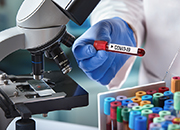Sensitivity of both Abbot and EUROIMMUN serologic assays poor during first 14 days of symptoms
THURSDAY, May 21, 2020 (HealthDay News) — The diagnostic specificity of severe acute respiratory syndrome coronavirus 2 (SARS-CoV-2) serologic assays varies, and sensitivity is poor during the first 14 days of symptoms, according to a study published online May 13 in Clinical Chemistry.
Mei San Tang, M.D., from the Washington University School of Medicine in St. Louis, and colleagues compared two commercial SARS-CoV-2 immunoglobulin G assays. A total of 103 specimens from 48 patients with polymerase chain reaction-confirmed SARS-CoV-2 infections and 153 control specimens were analyzed using serologic assays by Abbott and EUROIMMUN.
The researchers found that the Abbott SARS-CoV-2 assay had diagnostic specificity of 99.4 percent and sensitivity of 0.0, 30.0, 47.8, and 93.8 percent at less than three, three to seven, eight to 13, and ≥14 days post-symptom onset. On the EUROIMMUN assay, diagnostic specificity was 94.8 and 96.7 percent if borderline results were considered positive and negative, respectively. If borderline results were considered positive, the diagnostic sensitivity was 0.0, 25.0, 56.5, and 85.4 percent at less than three, three to seven, eight to 13, and ≥14 days, respectively. The qualitative concordance was 0.83 between the assays.
“Our results also demonstrate low sensitivity for detecting SARS-CoV-2 antibodies before 14 days post-symptom onset on both assays,” the authors write. “This argues that serologic status should not be assessed until 14 days post-symptom onset and confirms that molecular assays should remain the primary method for COVID-19 diagnosis.”
One author disclosed financial ties to the biotechnology industry.
Copyright © 2020 HealthDay. All rights reserved.








